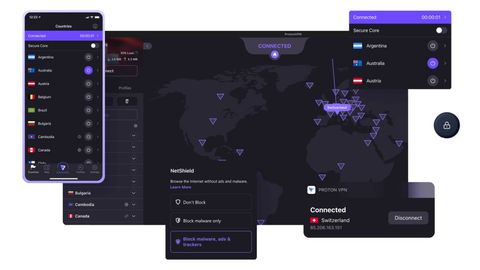Tom's Guide Verdict
Proton VPN lives up to its reputation as an excellent choice for the privacy-conscious, but also challenges the market leaders with its excellent streaming site and content unblocking power. Boosted WireGuard and Open VPN speeds, comprehensive apps, reliable connections, and one of the best free plans on the market mean that Proton VPN should definitely be on your shortlist.
Pros
- +
Apps are open source, secure, and very well built
- +
Unblocks Netflix, iPlayer, Prime Video, Disney+ and more
- +
Verified zero-logging
- +
Excellent free plan
- +
Among the fastest WireGuard speeds I've seen
- +
Mobile apps are excellent
Cons
- -
Plus plan is a little pricy
- -
Apps could be complex for beginners
- -
FAQ section could be intimidating to newbies
Why you can trust Tom's Guide
Proton has long been a leading name in the personal privacy industry. With products ranging from its excellent VPN to encrypted mail and even file storage, the Swiss company has a lot to live up to. In my comprehensive Proton VPN review, I'll be testing every single aspect of the service to see if it really is one of the best VPN services out there.
Boasting a hefty 2,700+ servers in 70 countries, Proton VPN has a good spread of locations around the world. That, combined with fully audited apps, a secure base in Switzerland – safe from the prying Five and 14 Eyes groups – and a highly regarded free VPN make Proton appear to be a very appealing package.
To help make up your mind, simply keep scrolling to find out all the nitty-gritty detail about Proton VPN and how it stacks up again rival VPNs. Or, if you want to skip to a particular section, just use the navigation menu to jump straight there.
Proton VPN on paper
| Number of servers | 2,700+ | Row 0 - Cell 2 |
| Server countries | 70 | Row 1 - Cell 2 |
| Supported platforms | Windows, Mac, Linux, Android, iOS | Row 2 - Cell 2 |
| Simultaneous connections | 10 | Row 3 - Cell 2 |
| Split tunneling | Yes | Row 4 - Cell 2 |
| Kill switch | Yes | Row 5 - Cell 2 |
| Protocols supported | WireGuard, OpenVPN, IKEv2, IPv6 | Row 6 - Cell 2 |
| Country of registration | Switzerland | Row 7 - Cell 2 |
| Support | Email, knowledgebase, live chat (not 24/7 yet) | Row 8 - Cell 2 |
Proton VPN 2-minute review
First and foremost, Proton VPN is there to protect your privacy. You'll get a kill switch to protect you if your connection ever fails, and strong encryption is used across the board. Its apps are also fully open-source, so you – or anyone else – can make sure there's nothing fishy going on.
Another big plus is the number of servers available worldwide. Paying customers have access to over 2,700 servers in 70 countries. That's a big improvement since my last review, and puts Proton's server network on a par with the likes of ExpressVPN, NordVPN, and Surfshark. Free users even have a generous 100 servers in three locations.
Proton VPN allows paying users to have the VPN active on up to 10 devices at any one time. That's quite generous and should suffice for the vast majority, but some other rivals like Surfshark and IPVanish offer unlimited simultaneous connections. As you'd expect, there's no data cap at all, so you can stay connected 24/7.
All users, regardless of which plan they choose, get unlimited bandwidth.
Proton hasn't made any sacrifices in order to maintain good privacy, though. In fact, it's one of the very best streaming VPNs, being able to unblock tons of Netflix locations, BBC iPlayer, Amazon Prime Video, Hulu, and tons more. It also has dedicated servers for accessing the unbiased Deutsche Welle news outlet – a critical resource for those living in countries subject to censorship.
Connections speeds improved considerably in my last round of testing. The WireGuard speeds jumped to a staggering 950+Mbps, placing itself among the fastest VPNs. OpenVPN didn't disappoint, either, maxing to 400Mbps - lower only than Surfshark (640Mbps) and Mullvad (410Mbps).
Proton's open-source apps are well-suited to experts, and those who enjoy having a lot of control over their software. Compared to the likes of ExpressVPN, they could seem a little overly complex, but I think they offer a great balance of function and form.
Proton VPN certainly isn't a cheap service at $4.99 a month, but is still a little cheaper than the most expensive providers like ExpressVPN and Astrill VPN. For those who'll use its unique features, this extra outlay will be worth it, but casual users may well find better value in the likes of Surfshark and even PureVPN.
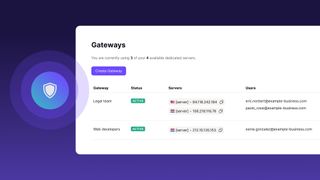
Latest updates
- Addition of over 900 new servers brings the total to over 2,700 across 70 countries
- Privacy tests showed no trackers on the Proton VPN website or in its apps
- Some of the best tracker-blocking capabilities of all VPN services
- Proton Free increased the number of available servers to over 100
- Proton Unlimited adds additional Proton services for a minimal cost
- All refunds are now in full, rather than pro-rata
- 3 more P2P servers added, now up to 20
- Even better streaming unblocking and speed results
- Unveiled Proton VPN for Business, the consumer service plus some business extras (Private Gateways, user management, the ability to restrict which users can access which gateways)
- Wider language support for Japanese, Georgian, Greek, Finnish, Norwegian, Swedish, Korean and more
Proton VPN price and payment
| Plan length | Overall cost | Monthly cost |
| 1 month | $9.99 | $9.99 |
| 1 year | $71.88 | $5.99 |
| 2 years | $119.76 | $4.99 |
Proton VPN has one of the best free options from any provider. Without paying anything at all, you can get an ad-free service with no data logging and no bandwidth limits. Plus you'll have over 100 servers to connect to in three locations, something unheard of from most free plans.
All paid versions of Proton VPN give you access to every feature. This includes thousands of servers worldwide and unblocking of most major TV streaming services. You can use the service on 10 different devices all at once, too.
Sign up for a single month and you'll pay $9.99, and extend that to a year and it'll drop to $5.99 a month. The biggest savings come on the two-year plan, which works out at $4.99 a month. That's a little cheaper than it was a couple of years ago, too – and although not as often as other providers, Proton does occasionally offer some extra discounts and deals. I've seen it drop to $3.99 in a special Cyber Monday VPN deal, and the one-month plan is often discounted to $8.99.
If you want full access to everything in the Proton suite (Proton Mail, Calendar, and Drive) prices start from $12.99 per month and drop to a reasonable $7.99 a month if you sign up for two years. That's pretty good value if you'll actually use the added apps – and it's much cheaper than the old 'Visionary' plan – but I expect most will just bag a VPN subscription and be done with it.
Notably, you can remain completely anonymous when signing up for Proton VPN. The platform supports Proton Mail email addresses and accepts payment via Bitcoin. That’s a big draw if you’re looking to stay as anonymous as possible.
Finally, Proton VPN offers a 30-day money-back guarantee, which is great if you want to try out the paid version without fully committing.
- More: Save some cash with the best cheap VPN
How private and secure is Proton VPN?
During the latest round of testing, I looked into how well Proton VPN spotted trackers and blocked them. Using NetSuite, a reliable malware and adblocker program, Proton VPN stopped an impressive amount of trackers and malware – only Norton, Mullvad, and Mozilla stopped more.
I checked Proton’s own website to see if the company itself uses trackers and was happy to find no trackers used on either the website or within the Android app.
Proton VPN is headquartered in Switzerland, which automatically gives the service a boost over most of the competition. The country is known for its very strong privacy laws, is neither in the US nor EU jurisdiction, and additionally, it’s not a member of the “14 Eyes” surveillance network.
Proton VPN's no-logging statement is comprehensive, and that's reflected in practice – the only data stored is your very last timestamp, which is immediately overwritten the next time you connect.
Using NetSuite, a reliable malware and adblocker program, Proton VPN stopped an impressive amount of trackers and malware
One of the most exciting and unique features that Proton VPN offers is what it calls Secure Core. This essentially means that when you connect to one of Proton's Secure Core servers, your connection is first routed through one of Proton VPN’s most protected servers.
Ranging from underground servers bunkers in Switzerland and Sweden to an old military base in Iceland, these servers are super secure and virtually immune to surveillance. So, if you're truly concerned about your activity being monitored, it's a great added feature.
Proton VPN also offers a built-in kill switch to protect your IP in case your connection drops. There’s no option to have the VPN automatically turn on when you connect to a public Wi-Fi network, but you can set Proton VPN to open a connection automatically when you turn on your computer.
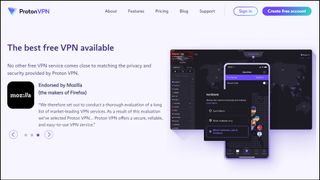
Proton VPN’s server network has grown to a respectable 2,700 servers spread across 70 countries. You have a good spread worldwide, and these servers are available on all platforms. Some providers have more, such as NordVPN (5,000+) and Private Internet Access (10,000+), but realistically Proton's range is more than enough.
Privacy obsessives will be pleased to note that Proton VPN offers Tor over VPN, which integrates your connection with the anonymous Tor network. In a single click, all data is routed through the Tor network which gives the user an extra layer of privacy as well as access to Onion sites. Other than NordVPN, I can’t name many VPNs that offer this as an integrated feature.
In January 2020 Proton VPN went through an independent audit by SEC Consult. The results were impressive, with just 11 issues found over all apps, none of which being high-risk.
While that might sound worrying, these audits are incredibly thorough, and when vulnerabilities are identified, it allows the developers to address them. And, thanks to the fact the apps are all open-source too, anyone interested can verify the fixes made.
In April 2022, Proton VPN also passed a no-logs audit, which proved the providers claims of not storing any activity data about its users.
All in all, I'm seriously impressed with Proton VPN's privacy and security, from cash payments to the audits, and if you're looking for a VPN to keep you safe online, I'm comfortable saying it's easily one of the most secure VPN services around today.
How fast is Proton VPN?
| WireGuard | 950+Mbps |
| OpenVPN | 400Mbps |
Following my latest round of VPN testing, I can confirm: Proton is one of the fastest VPN services I tested. In fact, between the last round of testing and the most recent, Proton' overall speeds got a considerable boost for both its WireGuard and OpenVPN protocols.
To begin my speed tests, I first connected to the fastest server from two locations, both with 1Gbps lines - a US residential location and a UK data center. After that, I checked the performance with SpeedTest.net (both via website, and command line app), SpeedOf.me, nPerf, and other benchmarking services.
I connected using both WireGuard and OpenVPN protocols. Each test was repeated five times, and it ran the full set in both morning and evening sessions. This data was analyzed to come up with and compare median speeds.
Proton ranks about average for most decent VPN services, so its effectiveness or overall quality hasn't been affected too much by its speeds.
When connected using WireGuard, Proton VPN peaked at 950+Mbps - last time it just peaked at 460Mbps. This is a little slower than last time, although it's by no means disastrous. However, only six other VPN services came as fast, including Surfshark, Mullvad, Windscribe, PrivadoVPN, and NordVPN.
Even in terms of OpenVPN, Proton is one of the faster providers out there. Topping out at around 400Mbps, only Mullvad and Surfshark clocked faster connections.
In my last review, I complained that when using WireGuard, Proton VPN took an age to establish a connection. Thankfully this has now been remedied, and it only takes a matter of seconds to get up and running.
How good is Proton VPN for streaming?
| Netflix | Working (UK, US, CA) |
| Prime | Working |
| YouTube | Working |
| iPlayer | Working |
| Disney Plus | Working |
| 10Play | Working |
| 9Now | Working |
| Hulu | Working |
| ITV Player | Working |
| All4 | Working |
While Proton VPN hits the mark for security and privacy, it also is packed with other fun and helpful features. For example, it is one of the best when it comes to unlocking Netflix, BBC iPlayer, Amazon Prime, and Disney+.
In mid-2021 Netflix changed how it restricts viewers using VPNs, and many providers are still struggling with access. However, there are a few that have found effective ways of overcoming this.
And, it seems, Proton VPN is one of those select few. In my testing, it was able to unblock not only US Netflix, but also UK and Canadian libraries, too. Few other providers can match this, and this performance earned Proton VPN a place on our Netflix VPN guide.
It's good news elsewhere, too. I was able to unblock BBC iPlayer from outside the UK, and access Amazon Prime Video, and Disney+. That's a coveted full house and more evidence that the Swiss provider isn't resting on its laurels and is investing in improving service across the board.
How good are Proton VPN's desktop apps?
Proton VPN has a nicely designed interface with many customizable options, although it could feel overwhelming – especially for newbies that aren’t used to all the protocols or how a VPN works. Thankfully the default settings are enough to keep you safe, so you really don’t have to touch anything.
With Windows VPN, Mac VPN and Linux VPN clients, all the bases are covered. When you first open it up, you’ll see a map with every active server location pinpointed. If you’re not a fan of the map, though, you can hide it and just see the server list, which is color-coded to show connection and transfer speeds before you click.
As a side-note, I think Proton VPN's map interface is much better than NordVPN's, and offers an intuitively visual way to globetrot around each server.
You're also treated to a nice amount of information about the servers themselves. Load is great to see (I wish more VPNs showed this), and you can also tell which servers are optimized for P2P (as not every one is).
Proton VPN's profiles features is a nifty usability trick that essentially allows you to save your frequently used settings.
Proton VPN's 'profiles' features is a nifty usability trick that essentially allows you to save your frequently used settings. For example, perhaps there's a particular server you've noticed works especially well for accessing US Netflix or for P2P, but you also regularly use a randomized Dutch connection for day-to-day browsing. Save them both as profiles, and you'll be able to connect to either in a single click.
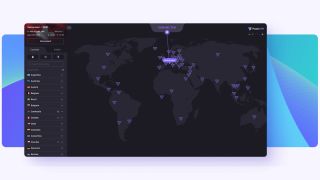
In-app you'll also see tons of info, including your IP, time connected, data up and downloaded, plus your average connection speeds.
In the settings, you can set preferences like the kill switch, split tunneling, configure Quick Connect, and DNS protection. I didn’t encounter any settings that were sticky or refused to change, a surprisingly common issue with software like this.
A feature that is activated by default is the VPN Accelerator. This uses some technical trickery to help speed up connections that might otherwise be sluggish.
One limitation of Proton VPN is that it doesn’t have an auto-connect option on insecure networks. But in reality, you wouldn’t want to chance compromising security.
How good are Proton VPN's mobile apps?
The Android VPN app isn’t much different than the Windows application. It looks, feels, and works almost identically with options for both portrait and landscape modes. And it has a few perks of its own. For one, the list of servers is in alphabetical order by city rather than by state. And split tunneling is present, which isn’t always available.
Proton VPN's iOS app looks a little different because of limitations with the platform, but the general navigation is the same. Split tunneling isn’t available, but this and other features are difficult, if not impossible to develop for Apple's mobile OS.
Overall, Proton VPN's mobile VPN apps are well-designed, powerful, and usable, and the fact the experience is much the same across all platforms means they're intuitive and pleasant to use.
Not a fan of Proton's apps? No worries. You can download all of its OpenVPN config files and use them in an app or device of your choice. That's great flexibility, and it'll even allow you to download the lot as a .zip file.
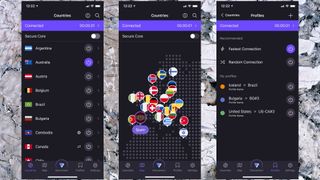
How good is Proton VPN's support?
You do have decent support options if you need a little bit of help installing or setting preferences within either the desktop or mobile app. You have more and better options if you use one of the paid subscriptions, including live support, though it isn’t available 24/7.
After your issue is resolved, Proton gives you the option to convert your live chat session to a ticket in case you need to follow up later. Its support agents are really good at walking you through issues while being friendly and quick to reply.
If you’re a little chat-shy, you can opt to use the knowledgebase instead. This area of the Proton website has a lot of articles, but they aren’t always helpful. Also, those designed to help are very technical and aren’t easy if you’re not familiar with VPN services. In fact, even if you are a little tech-savvy these articles could still be difficult to understand.
Proton VPN review: Final verdict
Proton VPN is one of the best VPNs I've seen if you prize privacy and security. There aren’t many other services that can top it when it comes to security and privacy, and while it did dip a bit in the speed department, it’s still on par with most VPNs.
The biggest plus for Proton VPN users is how well it taps into TV streaming services. If you’re a frequent traveler, this is a great service that lets you keep up with your favorite shows or watch your favorite teams play through your streaming accounts, even while out of town.
If you’re not 100 per cent committed to buying Proton VPN, you do have the option of using its free service first to get a feel of how it works. You won’t get every feature with this option, including TV streaming unlocking, but it is good for getting a feel for the service and how secure it is.
Tom's Guide rating: ⭐⭐⭐⭐½
Subscribe if:
✔️ You're looking for a decent free plan. While Proton's free service can't match up to its paid plan, it's still very useful for emergencies.
✔️ You want a provider that advocates for internet freedom. Proton as a company has demonstrated its commitment to internet freedom by offering, among other things, free servers dedicated to accessing Deutsche Welle's unbiased reporting.
✔️ You're a big streamer. Proton is a surprise standout when it comes to streaming and unblocking content, and is right up there with the very best.
Don't subscribe if:
❌ You're looking for a bargain. Proton is fairly pricey when compared to the likes of PIA and Surfshark.
❌ You want a larger network: Proton VPN's server network spreaded across 70 countries might be enough for most users, but other VPNs cover even more nations.
| Feature | Comments | Rating |
|---|---|---|
| Design | Intuitive and dynamic design with the dark mode as a standout | ⭐⭐⭐⭐ |
| Ease of use | Some desktop features may be too technical for regular users to understand | ⭐⭐⭐ |
| Performance | Despite proprietary technologies to increase speed, it’s mid-pack | ⭐⭐⭐ |
| Unblocking | Unblocks most sites on the paid subscription | ⭐⭐⭐⭐ |
| Security and privacy | State-of-the-art security with Swiss law protection and an independent audit | ⭐⭐⭐⭐⭐ |
| Customer support | Decent response time with countless guides | ⭐⭐⭐⭐ |
| Price | Not the most budget-friendly, but there’s a free plan for new users | ⭐⭐⭐⭐ |
How we test VPNs
Understanding how our team of experts tests VPNs is important. It lets you know that we really have got hands-on with these products, and that we’ve considered every feature, no matter how small. Some sites just give a rundown of specs found on a provider’s website – we endeavor to do quite a bit more than that.
First of all, we do check the provider websites, and note useful information like the number of servers and locations, whether you’re allowed to use every server for P2P, which encryption protocols are supported, the variety of operating systems it runs on, and tons more. We also check the pricing at this stage.
This initial scan gives us a baseline understanding of the service, and if there are any bold claims on-site we note them to make sure the customer isn’t being misled.
We’ll then dig into privacy policies. This is a very important piece of literature for any company, but for VPNs they need to be absolutely watertight. We’ll also go through the logging or zero-logging policy to look for gaps, and read any information available on independent audits.
Then it comes to testing the applications themselves. We test how easy it is to download and install, noting if any data collection options are clearly outlined to the user. We then inspect the default configuration to see what you have to ‘opt in’ for, and what features are available overall. We then play around with any additional features, such as ExpressVPN’s server speed test or NordVPN’s Double VPN. After we’ve gone through everything on the surface, the fun bit starts – trying to break things.
We throw all sorts of curveballs at these VPNs, like connecting to oddly configured networks, and killing processes to see if we can get the VPN to stop without activating the kill switch.
After we’ve had our fun, we check in with the support team to see if they’re helpful. Then, we’ll check a wide range of streaming sites to see if the VPN is able to access geo-blocked content, and we’ll run a series of speed tests over a few days and nights to get an accurate picture of what sort of connection speeds you can expect.


Mo is VPN Editor at Tom's Guide. Day-to-day he oversees VPN, privacy, and cybersecurity content, and also undertakes independent testing of VPN services to ensure his recommendations are accurate and up to date. When he's not getting stuck into the nitty-gritty settings of a VPN you've never heard of, you'll find him working on his Peugeot 205 GTi or watching Peep Show instead of finally putting up those shelves.
